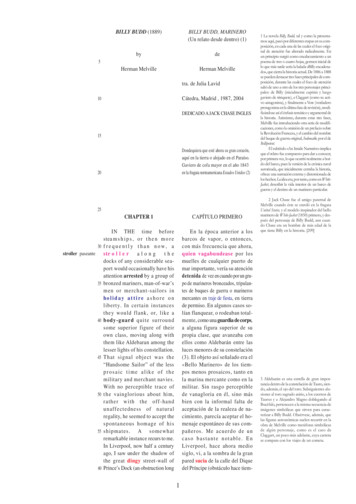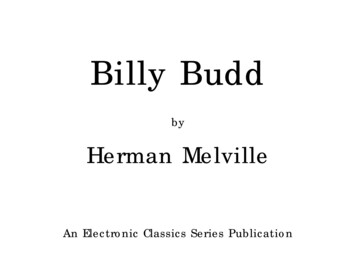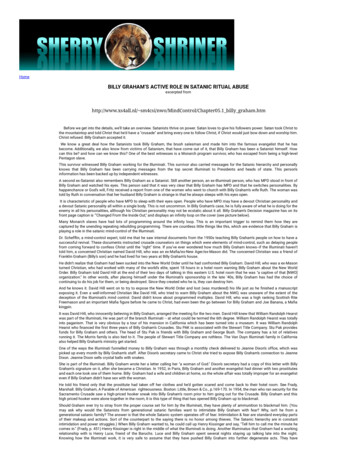
Transcription
Melville’s Bylly BuddJulia LivadBILLY BUDD (1889)BILLY BUDD, MARINERO(Un relato desde dentro) (1)bydeHerman MelvilleHerman Melville5tra. de Julia LavidCátedra, Madrid , 1987, 200410DEDICADO A JACK CHASE INGLES15Dondequiera que esté ahora su gran corazón,aquí en la tierra o alojado en el Paraíso.Gaviero de cofa mayor en el año 1843en la fragata norteamericana Estados Unidos (2)202530stroller paseante354045505560CHAPTER 1CAPÍTULO PRIMEROIN THE time beforestea m s h i p s , o r t h e n m o r ef r e q u e n t l y t h a n n o w, astr o l l e ralongthedocks of any considerable seaport would occasionally have hisattention arrested by a group ofbronzed mariners, man-of-war’smen or merchant-sailors inho l i d a y a t t i r e a s h o r e o nliberty. In certain instancesthey would flank, or, like abody-guard quite surroundsome superior figure of theirown class, moving along withthem like Aldebaran among thelesser lights of his constellation.That signal object was the“Handsome Sailor” of the lessprosaic time alike of themilitary and merchant navies.With no perceptible trace oft h e vainglorious about him,rather with the of f-handunaffectedness of naturalregality, he seemed to accept thespontaneous homage of hisshipmates. A somewhatremarkable instance recurs to me.In Liverpool, now half a centuryago, I saw under the shadow ofthe great dingy street-wall ofPrince’s Dock (an obstruction longEn la época anterior a losbarcos de vapor, o entonces,con más frecuencia que ahora,quien vagabundease por losmuelles de cualquier puerto demar importante, vería su atencióndetenida de vez en cuando por un grupo de marineros bronceados, tripulantes de buques de guerra o marinerosmercantes en traje de fiesta, en tierrade permiso. En algunos casos solían flanquear, o rodeaban totalmente, como una guardia de corps,a alguna figura superior de supropia clase, que avanzaba conellos como Aldebarán entre lasluces menores de su constelación(3). El objeto así señalado era el«Bello Marinero» de los tiempos menos prosaicos, tanto enla marina mercante como en lamilitar. Sin rasgo perceptiblede vanagloria en él, sino másbien con la informal falta deaceptación de la realeza de nacimiento, parecía aceptar el homenaje espontáneo de sus compañeros. Me acuerdo de uncaso bastante notable. EnLiverpool, hace ahora mediosiglo, vi, a la sombra de la granpared sucia de la calle del Diquedel Príncipe (obstáculo hace tiem-11 La novela Billy, Budd, tal y como la presentamos aquí, pasó por diferentes etapas en su composición, en cada una de las cuales el foco original de atención fue alterado radicalmente. Enun principio surgió como encabezamiento a unpoema de tres o cuatro hojas, germen inicial delo que más tarde sería la balada «Billy encadenado», que cierra la historia actual. De 1886 a 1888se pueden destacar tres fases principales de composición, durante las cuales el foco de atenciónsaltó de uno a otro de los tres personajes principales: de Billy (inicialmente capitán y luegogaviero de trinquete), a Claggart (como su activo antagonista), y finalmente a Vere (verdaderoprotagonista en la última fase de revisión), modificándose así el énfasis temático y argumental dela historia. Asimismo, durante estas tres fases,Melville fue introduciendo otra serie de modificaciones, como la omisión de un prefacio sobrela Revolución Francesa, y el cambio del nombredel buque de guerra original, Indomable, por el deBellipotent.El subtítulo «An Inside Narrative» implicaque el relato fue compuesto para dar a conocer,por primera vez, lo que ocurrió realmente a bordo del barco, pues la versión de la crónica navalautorizada, que inicialmente cerraba la historia,ofrece una narración externa y distorsionada delos hechos. La idea era, por tanto, como en WhiteJacket, describir la vida interior de un barco deguerra y el destino de un marinero particular.2 Jack Chase fue el amigo paternal deMelville cuando éste se enroló en la fragataUnited States, y el modelo inspirador del bellomarinero de White-Jacket (1850) primero, y después del personaje de Billy Budd, aun cuando Chase era un hombre de más edad de laque tiene Billy en la historia. [209]3 Aldebarán es una estrella de gran importancia dentro de la constelación de Tauro, siendo, además, el ojo del toro. Subsiguientes alusiones al toro sagrado asirio, a los cuernos deTaurus y a Alejandro Magno doblegando alBucéfalo, pertenecen a la misma secuencia deimágenes simbólicas que sirven para caracterizar a Billy Budd. Obsérvese, además, quelas figuras astronómicas suelen recurrir en laobra de Melville como metáforas simbólicasde algún personaje, como es el caso deClaggart, un poco más adelante, cuya carrerase compara con los viajes de un cometa.
Melville’s Bylly BuddJulia Livadsince removed) a common sailor, sointensely black that he must needshave been a native African of theunadulterate blood of Ham. A5 symmetric figure much above theaverage height. The two ends of agay silk handkerchief throwngay vistoso, llamativoloose about the neck danced uponthe displayed ebony of his chest;10 in his ears were big hoops of gold,and a Scotch Highland bonnetwith a tartan band set off hisshapely head.po eliminado), a un marinero raso,tan intensamente negro, que por[211] fuerza debía ser un africanonativo de la pura sangre de Cam(4), con una figura armoniosa muypor encima de la talla media. Losdos extremos de un alegre pañuelo de seda, suelto por el cuello, bailaban sobre el ébano desplegado desu pecho: llevaba grandes aros deoro en las orejas, y un gorro escocés, con una cinta de tartán, remataba su proporcionada cabeza.It was a hot noon in July; andhis face, lustrous withperspiration, beamed withbarbaric good humor. In jovialsallies right and left, his whiteteeth flashing into he rollickedalong, the centre of a companyof his shipmates. These weremade up of such an assortmentof tribes and complexions aswould have well fitted them tobe marched up by AnacharsisCloots before the bar of the firstFrenchAssemblyasRepresentatives of the HumanRace. At each spontaneoustribute rendered by the wayfarersto this black pagod of a fellowthe tribute of a pause and stare,andlessfrequentanexclamation,- the motley retinueshowed that they took that sortof pride in the evoker of it whichthe Assyrian priests doubtlessshowed for their grandsculptured Bull when the faithfulprostrated themselves.Era un cálido mediodía de julio, y, su cara, reluciente de sudor, lanzaba destellos de buenhumor bárbaro. Con joviales salidas a izquierda y a derecha, haciendo refulgir sus blancos dientes, avanzaba juguetón, como centro de su grupo de marineros. Éstos se componían de tal variedadde tribus y colores, que les hubiera hecho adecuados para serpresentados por Anacharsis Cloots(5) ante la tribuna de la primeraAsamblea Francesa, como Representantes de la Raza Humana. Acada tributo espontáneo que lostranseúntes rendían a esa pagoda negra de hombre —el tributode una detención y una mirada,y con menos frecuencia, una exclamación—, el abigarrado séquito mostraba tener ese tipo deorgullo en quien lo provocaba,que sin duda mostraban los sacerdotes asirios por su gran Toroesculpido cuando los fieles sepostraban.1520253035grand magnífico, grandioso, majestuoso 40(4) Los descendientes de Cam, hijo de Noé,fueron maldecidos por este último, porqueCam se había burlado de él (Génesis 9: 2225). La maldición, consistente en la negrurade la piel, ha justificado tradicionalmente laesclavitud de la raza negra.(5) Jean Baptiste du Val-de-Grâce, barón deCloots (1755-1794). Noble prusiano que, cambiando su nombre por el de Anarchasis, sepresentó en 1790 ante la Asamblea NacionalFrancesa, con un grupo de seguidores de diversos países, pidiendo el derecho a confederar la raza humana.Volviendo al tema.To return.Si en algunos casos era unpoco un Murat (6) náutico, al lucir su persona en tierra firme, elBello Marinero de aquellos tiempos no mostraba nada de ese dandy Billy-be-Dam (7), divertidopersonaje, hoy casi extinguido,pero que todavía se encuentra aveces y en una forma aún más divertida que la original, en el timón de las lanchas en el tempestuoso Canal de Erie, o, más frecuentemente, fanfarroneando por lastabernas, junto al camino de la sirga.Invariablemente un experto[212] en su peligroso oficio,If in some cases a bit of anautical Murat in setting forthhis person ashore, the Handsome Sailor of the period inquestion evinced nothing of the50 dandified Billy-be-Damn, an amusingcharacter all but extinct now,now hoy en día, en la actualidadbut occasionally to beencountered, and in a form yetmore amusing than the original,55 at the tiller of the boats on thetempestuous Erie Canal or, morelikely, vaporing in thegroggeries along the tow-path.Invariably a proficient in his60 perilous calling, he was also4526 Joaquín Murat (1767?-1815), generalnapoleónico, nombrado rey de Nápoles porNapoleón, y conocido por su elegancia.7 Expresión coloquial que indica desaprobación; algo así como «ese condenado Billy».
Melville’s Bylly BuddJulia Livadmore or less of a mighty boxeror wrestler. It was strength andbeauty. Tales of his prowesswere recited. Ashore he was thechampion;afloatthespokesman; on every suitableoccasion always foremost.Close-reefing top-sails in a gale,there he was, astride theweather yard-arm-end, foot inthe Flemish horse as “stirrup,”both hands tugging at the“earring” as at a bridle, in verymuch the attitude of youngAlexander curbing the fieryBucephalus. A superb figure,tossed up as by the horns ofTaurus against the thunderoussky, cheerily hallooing to thes t r e n u ous file along the spar.también era más o menos unpoderoso boxeador o luchado r.Era la fuerza y la belleza.Se cantaban relatos de sus proezas. En tierra, era el campeón; enel mar, el portavoz; en cualquierocasión apropiada, siempre el primero. Haciendo rizos en las jarciasen una galerna, allí estaba, a caballodel penol a barlovento, con el pieen el marchapié como estribo, ambas manos sujetándose a la empuñadura como una brida, en actitudsemejante al joven Alejandro, domeñando al feroz Bucéfalo. Soberbia figura, lanzada a lo alto, comopor los cuernos de Taurus contrael cielo tormentoso, saludandojubilosamente a la fuerte hilera alo largo de la verga.The moral nature wasseldom out of keeping with thephysical make. Indeed, exceptphysical make constitución física25 as toned by the former, thecomeliness and power, alwaysattractiveinmasculineconjunction, hardly could havedrawn the sort of honest homage30 the Handsome Sailor in someexamples received from his lessgifted associates.La condición moral rara vezdejaba de estar de acuerdo con lafigura física. Desde luego, deno ir en armonía con aquélla,la belleza y la fuerza, siempreatractivas en conjunción masculina, difícilmente habrían atraídoel tipo de homenaje sincero queel bello marinero, en algunos casos, recibía de sus compañerosmenos agraciados.Such a cynosure, at least incynosure n. 1 a centre of attractionor admiration. 2 a guiding star. 35 aspect, and something such tooTal blanco de todas las miradas,al menos en aspecto, y algo de ellotambién en naturaleza, aunque conimportantes variaciones, que se pondrán de manifiesto en el transcursodel relato, era el garzo Billy Budd,o Baby Budd, como más familiarmente, en circunstancias que luego se indicarán, se le llegó a llamar finalmente; de veintiún añosde edad, gaviero de proa de la Flota Británica, hacia el final de la última década del siglo xviii. No mucho antes de la época del relatosubsiguiente, había entrado al servicio del Rey, habiendo sido forzado a pasarse, en los mares que rodean a Inglaterra, de un barco mercante inglés que regresaba a puerto,a un setenta-y-cuatro cañones quesalía, la nave de Su MajestadBellipotent; barco que, como noera raro en aquellos días de apresuramiento, se había visto obligado a hacerse a la mar con menosde su número adecuado de hombres. Inmediatamente cayó sobre51015204045505560in nature, though withimportant variations madeapparent as the story proceeds,was welkin-eyed Billy Budd,o r Baby Budd, as morefamiliarly under circumstanceshereafter to be given he at lastcame to be called, aged twentyone, a foretopman of the Britishfleet toward the close of the lastdecade of the eighteenthcentury. It was not very longprior to the time of the narrationthat follows that he had enteredthe King’s Service, having beenimpressed on the Narrow Seasfrom a homeward-boundEnglish merchantman into aseventy-four outward-bound,H.M.S. Indomitable; whichship, as was not unusual in thosehurried days, having beenobliged to put to sea short of herproper complement of men.Plump upon Billy at first sight3garzo persona que tiene los ojosazules
Melville’s Bylly Budd51015202530354045505560Julia Livadin the gangway the boardingof ficer Lieutenant Ratcliffpounced, even before themerchantman’s crew wasformally mustered on thequarter-deck for his deliberateinspection. And him only heelected. For whether it wasbecause the other men whenranged before him showed to illadvantage after Billy, or whetherhe had some scruples in view ofthe merchantman being rathershort-handed, however it mightbe, the officer contented himselfwith his first spontaneouschoice. To the surprise of theship’s company, though much tothe Lieutenant’s satisfaction,Billy made no demur. But,indeed, any demur would havebeen as idle as the protest of agoldfinch popped into a cage.Billy, a primera vista, en la escalera, el teniente Ratcliffe, oficialde reclutamiento, antes de que latripulación del mercante se dispusiera formalmente para revista encubierta, para su detenida inspección. Y sólo le eligió a él. Pues,bien fuese porque los demás hombres, cuando se alinearon ante él,se mostraban en desventaja conrespecto a Billy, o bien porque tuviera escrúpulos al ver que el [213]barco mercante estaba bastante falto de hombres, fuera lo que fuese,el oficial se contentó con su primera elección espontánea. Parasorpresa de la tripulación del barco, aunque con gran satisfaccióndel teniente, Billy no puso reparos. Pero, de hecho, cualquier reparo hubiera sido tan inútil comola protesta de un canario encerrado en una jaula.Noting this uncomplainingacquiescence, all but cheerful onemight say, the shipmates turned asurprised glance of silent reproachat the sailor. The Shipmaster wasone of those worthy mortals foundin every vocation, even thehumbler ones- the sort of personwhom everybody agrees incalling “a respectable man.” Andnor so strange to report as it mayappear to be- though a ploughmanof the troubled waters, life-longcontending with the intractableelements, there was nothing thishonest soul at heart loved betterthan simple peace and quiet. For therest, he was fifty or thereabouts,a little inclined to corpulence, aprepossessing face, unwhiskered,and of an agreeable color- arather full face, humanelyintelligent in expression. On afair day with a fair wind and allgoing well, a certain musicalchime in his voice seemed to bethe veritable unobstructedoutcome of the innermost man. Hehad much prudence, muchconscientiousness, and there wereoccasions when these virtues werethe cause of overmuchdisquietude in him. On a passage,so long as his craft was in anyproximity to land, no sleep forCaptain Graveling. He took toAl notar su dócil aquiescencia, casi jubilosa, diríamos, el capitán lanzó una mirada de silencioso reproche al marinero. Elcapitán era uno de esos dignosmortales que se encuentran en todos los oficios, incluso en losmás humildes; el tipo de personaa quien todos convienen en llamar «un hombre respetable». Y,no tan extraño de señalar comopodría parecer, aunque arador delas agitadas aguas, luchando todala vida con los elementos adversos, no había nada que amasemás este alma honesta que la calma sencilla y la tranquilidad. Porlo demás, rondaba los cincuenta, con cierta tendencia a la corpulencia, de rostro atractivo, sinpatillas, y de un color agradable;un rostro más bien lleno, de expresión humana e inteligente. Enun día claro, con viento propicio y yendo todo bien, cierta vibración musical de su voz parecía ser el auténtico producto libre de su ser más íntimo. Teníamucha prudencia, mucha meticulosidad, y había ocasionesen que estas virtudes eran paraél la causa de excesiva inquietud. En una travesía, encuanto su embarcación estabapróxima a tierra, no había sueño para el capitán Graveling. Se4introducir «su» sería mejor
Melville’s Bylly Budd510proffer give, entregar, dar1520253035404550Julia Livadheartthoseseriousresponsibilities not so heavilyborne by some shipmasters.tomaba a pecho esas seriasresponsabilidades que no tomantan en serio otros capitanes.Now while Billy Budd wasdown in the forecastle gettinghis kit together, theIndomitable’s Lieutenant, burlyand bluff, nowise disconcerted byCaptain Graveling’s omitting toprofferthe customaryhospitalities on an occasion sounwelcome to him, an omissionsimply caused by preoccupationof thought, unceremoniouslyinvited himself into the cabin,and also to a flask from the Xspirit-locker, a receptacle whichhis experienced eye instantlydiscovered. In fact he was one ofthose sea-dogs in whom all thehardship and peril of naval lifein the great prolonged wars of histime never impaired the naturalinstinct for sensuous enjoyment.His duty he always faithfully did;but duty is sometimes a dryobligation, and he was forirrigating its aridity, whensoeverpossible, with a fertilizingdecoction of strong waters. Forthe cabin’s proprietor there wasnothing left but to play the partof the enforced host withwhatever grace and alacrity werepracticable. As necessary adjunctsto the flask, he silently placedtumbler and water-jug before theirrepressible guest. But excusinghimself from partaking just then,he dismally watched theunembarrassedofficerdeliberately diluting his grog alittle, then tossing it off in threeswallows, pushing the emptytumbler away, yet not so far as tobe beyond easy reach, at the sametime settling himself in his seatand smacking his lips with highsatisfaction, looking straight atthe host.Entonces, mientras Billy Budd estaba abajo en el castillo de proa,ordenando s us cosas, el t e n i e n t e del Bellipotent, rudo ytosco, nada desconcertado porqueel capitán Graveling hubiera dejado de ofrecerle las acostumbradas hospitalidades en una ocasióntan poco grata, omisión causadasimplemente por las preocupaciones, se invitó a sí mismo a la cabina sin ceremonias, y también asacar un frasco del armario de lasbebidas, receptáculo que su ojoexperto descubrió al instante. Dehecho, él era uno de esos lobosde mar en quienes la dureza y elpeligro de la vida naval, en lasgrandes y prolongadas guerras desu tiempo, nunca habían perjudicado al instinto natural de disfrute sensible. Siempre cumplía fielmente con su deber, pero el debera veces es una obligación árida, yera partidario [214] de regar suaridez con una pociónfertilizadora de aguas fuertes. Alpropietario de la cabina no le quedó más remedio que desempeñarel papel de anfitrión obligado, contoda la gracia y animación quefuera posible. Como accesoriosnecesarios a la botella, puso ensilencio un vaso y un jarro de aguaante el irreprimible invitado. Pero,excusándose de acompañarle enese momento, observó abatidocómo el oficial, nada cohibido,diluía deliberadamente el brebajeun poco, y luego lo deglutía entres sorbos, y retiraba el vaso vacío, pero no tan lejos que quedarafuera de alcance, instalándose almismo tiempo en su asiento y, relamiéndose con gran satisfacción, mirando cara a cara al anfitrión.These proceedings over, theMaster broke the silence; and55 there lurked a rueful reproachin the tone of his voice:“Lieutenant, you are going to takemy best man from me, the jewelof ‘em.”Acabados estos asuntos,el capitán rompió el silencio;y en el tono de su voz acechaba un triste reproche:—Teniente, se va a llevar usted a mi mejor hombre, la joya detodos.605
Melville’s Bylly BuddJulia Livad“Yes, I know,” rejoined theother, immediately drawing backthe tumbler preliminary to areplenishing; “Yes, I know. Sorry.”—Sí, ya lo sé —contestó elotro, volviendo a acercar enseguidael vaso, como preliminar para rellenarlo—. Sí, ya lo sé. Lo siento.“Beg pardon, but you don’tunderstand, Lieutenant. See herenow. Before I shipped that youngfellow, my forecastle was a ratpit of quarrels. It was black times,I tell you, aboard the Rights here.I was worried to that degree mypipe had no comfort for me. ButBilly came; and it was like aCatholic priest striking peace inan Irish shindy. Not that hepreached to them or said or didanything in particular; but a virtuewent out of him, sugaring the sourones. They took to him likehornets to treacle; all but the Xbuffer of the gang, the bigshaggy chap with the fire-redwhiskers. He indeed out of envy,perhaps, of the newcomer, andthinking such a ‘sweet andpleasant fellow,’ as he mockinglydesignated him to the others,could hardly have the spirit of agame-cock, must needs bestirhimself in trying to get up an uglyrow with him. Billy forebore withhim and reasoned with him in apleasant way- he is something likemyself, Lieutenant, to whomaught like a quarrel is hatefulbut nothing served. So, in thesecond dog-watch one day theRed Whiskers in presence of theothers, under pretence of showingBilly just whence a sirloin steakwas cut- for the fellow had oncebeen a butcher- insultingly gavehim a dig under the ribs. Quick aslightning Billy let fly his arm. Idare say he never meant to doquite as much as he did, butanyhow he gave the burly fool aterrible drubbing. It took abouthalf a minute, I should think. And,lord bless you, the lubber wasastonished at the celerity. And willyou believe it, Lieutenant, the RedWhiskers now really loves Billyloves him, or is the biggesthypocrite that ever I heard of. Butthey all love him. Some of ‘em dohis washing, darn his old trousersfor him; the carpenter is at oddtimes making a pretty little chestPerdóneme, pero no me entiende, teniente. Mire aquí. Antes de embarcar a ese joven, micastillo de proa era una ratonerade peleas. Fueron tiempos malos,se lo digo, a bordo del Derechos.Yo estaba preocupado hasta talpunto que ni la pipa me consolaba. Pero llegó Billy y fue comoun cura católico predicando pazen una pelea irlandesa. No es quelos predicara o les dijera nada enparticular, pero de él salía unavirtud que endulzaba a los agrios.Les gustó como a los tábanos lamiel, a todos menos al jefecillode la banda, ese tipo grande ehirsuto, de patillas rojo fuego.Quizá, por envidia del recién llegado, y creyendo que «un tipo tandulce y agradable», comoburlonamente le designaba ante losdemás, difícilmente tendría el ánimo de un gallo de pelea, no pudopor menos de agitarse paraintentar provocar una granpelea con él. Billy leaguantaba y razonaba con élde modo agradable —es unpoco como yo, teniente, queodia t odo lo que sean peleas—, pero nada sirvió. Así que un día,en el segundo cuartillo de guardia,el patillas rojas, en presencia de losdemás, con el pretexto de mostrar aBilly por dónde se cortaba un filete de solomillo, pues el tipo había sidoantes carnicero, le golpeó bajo las costillas de [215] forma insultante. Rápido como el rayo, Billy lanzó el brazo. Me atrevo a decir que nunca pensóhacer tanto como hizo, pero, de cualquier modo, le dio a aquel tonto grosero un golpe terrible. Todo sucedió en medio minuto, diría yo. Y,Dios nos bendiga, el fanfarrón se quedó asombrado de su rapidez. Y, ¿locreerá, teniente?, el patillas rojasahora quiere de veras a Billy, lequiere, o es el mayor hipócrita quejamás haya conocido. Pero todosle quieren. Algunos le lavan laropa, le remiendan sus viejos pantalones; el carpintero, en sus ratos libres, le está haciendo un bo-5101520treacle sirope, melazashaggy velludo, peludo25bestir exert or rouse onself, agitar, 30darse prisa, incitar, menear, mover,remover35aught anything at all, para nada40455055606
Melville’s Bylly BuddJulia Livadof drawers for him. Anybody willdo anything for Billy Budd;and it’s the happy family here.But now, Lieutenant, if that5 young fellow goes- I knowhow it will be aboard theRights. Not again very soonshall I, coming up from dinner,lean over the capstan smoking10 a quiet pipe- no, not very soonagain, I think. Ay, Lieutenant, youare going to take away the jewelof ‘em; you are going to take awaymy peacemaker!” And with that15 the good soul had really some adoin checking a rising sob.nito cofre con cajones. Cualquiera está dispuesto a hacer cualquiercosa por Billy Budd; y es comouna familia feliz. Per o a h o r a ,teniente, si ese joven se va,no sé lo que pasará a bordo delD e re c h o s . Ya n o v o l v e r éd e sp ués de la cena a apoyarme sobre el cabrestante a fumartranquilamente la pipa. no, muypronto ya no podré, creo. ¡Ay!, teniente, se va usted a llevar a la joya;¡se va a llevar a mi pacificador!Y con eso, al buen nombrele costó ahogar un sollozoincipiente.“Well,” said the officer whohad listened with amusedinterest to all this, and nowwaxing merry with his tipple;“Well, blessed are thepeacemakers, especially thefighting peacemakers! And suchare the seventy-four beautiessome of which you see pokingtheir noses out of the port-holesof yonder war-ship lying-to forme,” pointing thro’ the cabinwindow at the Indomitable. “Butcourage! don’ t look sodownhearted, man. Why, Ipled g e y o u i n a d v a n c e t h eroyal approbation. Restassured that His Majestywill be delighted to knowthat in a time when his hardtack is not sought for by sailorswith such avidity as should be; atime also when some shipmastersprivily resent the borrowing fromthem a tar or two for the service;His Majesty, I say, will bedelighted to learn that oneshipmaster at least cheerfullysurrenders to the King, theflower of his flock, a sailor whowith equal loyalty makes nodissent.- But where’s my beauty?Ah,” looking through the cabin’sopen door, “Here he comes; and,by Jove- lugging along hischest- Apollo with hisportmanteau!- My man,”stepping out to him, “you can’ttake that big box aboard a warship. The boxes there ar emostly shot-boxes. Put yourduds in a bag, lad. Boot andsaddle for the cavalryman, bag—Bien —dijo el teniente, quehabía estado escuchando todo estocon interés divertido, y que ahorase empezaba a poner alegre con lossorbos—: bueno, benditos sean lospacificadores, especialmente lospacíficos que pelean. Así son lassetenta y cuatro bellezas, algunasde las cuales ve usted asomando lanariz por las portas de aquel barcode guerra que está allí esperándome —y señalando por la ventana de la cabina al Bellipotent—.Pero, ¡valor!, no ponga esa expresión tan descorazona-dora, hombre. Vaya, le garantizo por adelantado la aprobación real. Descanseen la seguridad de que a Su Majestad le encantará saber que, enuna época en que los marineros nobuscan su duro servicio con la avidez que debiera ser; una época,también, en que a algunos capitanes les duele prestar un marineroo dos para el servicio; a Su Majestad, repito, le encantará saber que por lo menos un capitán entrega jubilosamente alRey la flor de su rebaño, unmarinero que, con la mismalealtad, no pone reparos. Pero¿dónde está mi belleza? Ah —mirando por la puerta abierta dela cabina—, ahí viene; y, porJúpiter, arrastrando su cofre,¡Apolo con su equipaje! Eh,muchacho —acercándose a él—, no puedes llevar esa caja tangrande a bordo de un barco deguerra. Allí las cajas son, en sumayoría, cajas [216] de municiones. Mete tus trapos en unabolsa, chico. Botas y silla para el2025303540resent take offence at455055607
Melville’s Bylly BuddJulia Livadand hammock for the man-ofwar’s man.”de caballería, bolsa y hamaca parael marino de guerra.The transfer from chest to bagSe hizo el traslado del cofreal saco. Y después de ver a suhombre en el bote y de seguirleallí, el teniente se alejó del Derechos del Hombre. Ese era elnombre del barco m e r c a n t e ,aunque su capitán y tripulantes lo abreviaban al estilomarinero en el Derechos. Elterco propietario de Dundeeera un leal admirador de ThomasPaine, cuyo libro, en réplica a lasacusaciones de la Revolución Francesa, se había publicadoentonces, hacía algún tiempo, y había llegado a todas partes. Al bautizar a su barco según el título delvolumen de Paine, el hombre deDundee era algo así como aquelarmador contemporáneo, StephenGirard de Filadelfia, cuyas simpatías, similares a su tierra natal y asus filósofos liberales, evidenció,al dar a sus barcos los nombres deVoltaire, Diderot, etcétera (8).5 was made. And, after seeing his10rejoinder reply 152025man into the cutter and thenfollowing him down, theLieutenant pushed off from theRights-of-Man. That was themerchant-ship’s name; tho’ by hermaster and crew abbreviated insailor fashion into The Rights. Thehard-headed Dundee owner was astaunch admirer of Thomas Painewhose book in rejoinder toBurke’s arraignment of the French XRevolution had then beenpublished for some time and hadgone everywhere. In christeninghis vessel after the title of Paine’svolume, the man of Dundee wassomething like his contemporaryshipowner, Stephen Girard ofPhiladelphia, whose sympathies,alike with his native land and itsliberal philosophers, he evinced bynaming his ships after Voltaire,Diderot, and so forth.30But now, when the boatswept under the merchantman’sstern, and officer and oarsmenwere noting- some bitterly andothers with a grin,- the name35 emblazoned there; just then itwas that the new recruit jumpedup from the bow where thecoxswain had directed him to sit,and waving his hat to his silent40 shipmates sorrowfully lookingover at him from the taffrail,bade the lads a genial goodbye. Then, making a salutationas to the ship herself,45 “And good-bye to you too, oldRights-of-Man.”Pero ahora, cuando el bote pasaba bajo la popa del barco mercante, y el oficial y los remerosnotaban —unos con amargura yotros con una sonrisa— el nombre esmaltado allí, fue entoncescuando el nuevo recluta dio unsalto en la proa, donde el patrónle había mandado sentarse, y, agitando el sombrero a sus compañeros silenciosos, que le mirabandesde el coronamiento de popa,mandó un cordial adi
1 La novela Billy, Budd, tal y como la presenta-mos aquí, pasó por diferentes etapas en su com-posición, en cada una de las cuales el foco origi-nal de atención fue alterado radicalmente. En un principio surgió como encabezamiento a un poema de tres o cuatro hojas, germen inicial de lo que más tarde sería la balada «Billy encadena-










